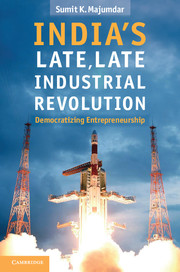Book contents
- Frontmatter
- Contents
- Figures
- Tables
- Acknowledgments
- Preface
- 1 Vent for growth
- 2 Industrial revolutions
- 3 Aspects of Indian enterprise history
- 4 The emergence of modern industry
- 5 Asian late industrialization
- 6 Democratizing entrepreneurship
- 7 Contemporary India
- 8 The services sector debate
- 9 A paean for manufacturing
- 10 Reindustrializing India
- Appendix
- Notes
- Bibliography
- Index
Preface
Published online by Cambridge University Press: 05 June 2012
- Frontmatter
- Contents
- Figures
- Tables
- Acknowledgments
- Preface
- 1 Vent for growth
- 2 Industrial revolutions
- 3 Aspects of Indian enterprise history
- 4 The emergence of modern industry
- 5 Asian late industrialization
- 6 Democratizing entrepreneurship
- 7 Contemporary India
- 8 The services sector debate
- 9 A paean for manufacturing
- 10 Reindustrializing India
- Appendix
- Notes
- Bibliography
- Index
Summary
The Maharaj and the saffron
I met my first payroll when I was 19 years old. There was a convention, in the hostel in Bombay for commerce, law, and science students that I stayed in as an undergraduate student, that a final-year commerce student or a postgraduate law or science student would become the Mess Secretary for each of the four messes that provided meals to residents. In my final year, it was not a case of me volunteering to become the Mess Secretary. It was a case of when on parade the entire line stepping back and leaving me stranded ahead. Thus, I, as a non-vegetarian Bengali, found myself the Mess Secretary of a Gujarati vegetarian mess. The Gujarati messes had a person of Gujarati origin designated as the Maharaj. He was the chief chef, the business manager and the major-domo. As the operations boss, he had hired a number of Maharashtrian helpers. These were supernumerary peasants, from the Konkan region of Maharashtra, whose family plots could not sustain their existence. They came to Bombay searching for work. Thus, in the course of my Mess Secretary tenure, I entertained several requests for an extra day off because a person had to go home to Konkan to lend a hand in harvesting the crops. But, it is not these sons of the Konkan soil that the story is about.
- Type
- Chapter
- Information
- India's Late, Late Industrial RevolutionDemocratizing Entrepreneurship, pp. xvii - xxviPublisher: Cambridge University PressPrint publication year: 2012



